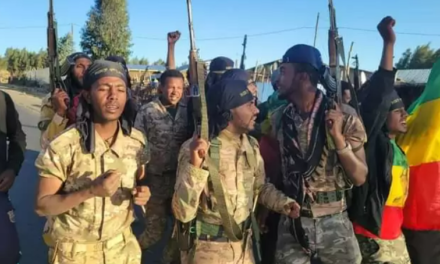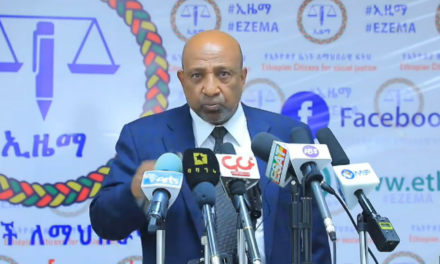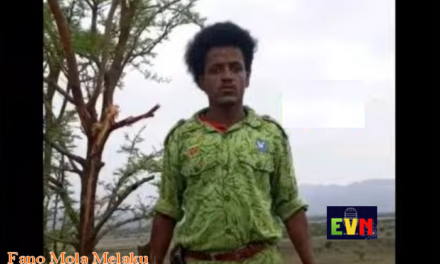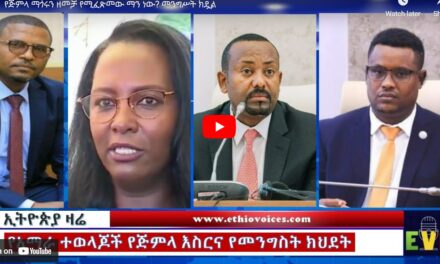September 18, 2023
The Ethiopian Human Rights Commission (EHRC) continues to closely monitor the deteriorating human rights situation in Amhara Region since April 2023 which has been escalating into widespread armed conflict since August 2023.
In its statement of August 14, 2023, the Commission underscored the actual and potential impact of the conflict and measures taken by state security forces on the human rights situation, particularly on civilians, and urged for a peaceful resolution and immediate measures to protect civilians. EHRC also continues to monitor the human rights impact of the State of Emergency (SoE) declared on August 4, 2023, including by engaging with the SoE Command Post, the SoE Inquiry Board, and relevant government bodies as well as other relevant government security actors.
The Commission is deeply concerned by its findings of instances of attacks targeting civilians, extra-judicial killings, and arbitrary detention and calls for urgent attention.
Information from residents in the Amhara Region, victims, families of victims, and eyewitnesses shows that the conflict has further spread to various woredas of the region and continues to expose civilians to greater risk. Areas affected between August 25 and September 5, 2023, for example, include Debre Markos in East Gojjam Zone, Adet and Merawi in North Gojam Zone; Debre Tabor in Southern Gondar Zone; Delgi in Central Godar Zone; Majetie, Shewa Robit and Antsokiya towns in Northern Shoa Zone and the surrounding rural towns/kebeles. Findings from these areas indicate many civilians were killed, physically injured, and their properties destroyed. Families of victims and eyewitness reports also indicate that crossfire or heavy artillery shelling related civilian casualties include people carrying out routine activities such as farm work or walking on streets and even people who were inside their homes.
Extrajudicial killings committed by state security forces in the context of armed conflict are extremely concerning. For example, between July 31 and September 9, 2023, widespread extrajudicial killings were committed, particularly in Adet, Debre Markos, Debre Tabor, Jiga, Lemi, Majetie, Merawi, Merto Lemariam, and Shewa Robit towns. Among victims of extrajudicial killings are persons arrested in house-to-house searches, unarmed civilians found on the streets during the conflict, persons suspected of hiding weapons, some civilians found outside past curfew hour, and detained combatants/members of the armed group (commonly known as Fano). These findings warrant full investigation by the EHRC and the SoE Inquiry Board.
Beyond the detentions and places of detention officially reported by the SoE Command Post, there is widespread arbitrary detention by state security forces in the context of the SoE particularly in Amhara Region, Addis Ababa and Oromia Region. Such detentions took place, for instance, in Bahir Dar, Debre Tabor, Debre Markos, Finote Selam, Gondar, Kobo, Lalibela, Mekaneselam, and Shewa Robit towns of the Amhara Region; in Sheger city of the Oromia Region; and in Addis Ababa. Amongst those detained in the premises of Police Training College found in Sidama Region (commonly known as Abosto) a number of detainees were released, but an unknown number remain in detention at the time of release of this statement. “Supporting the armed group” and/or “suspected of hiding weapons” are the main reasons the security authorities give for these arrests.
Regarding the temporary centre for the homeless, in Oromia Region, Sheger City, Gelan Sub-City, commonly known as Sida Awash Woreda, where, both before and in the context of the SoE, individuals including women, children and people living on the streets are detained, EHRC was able to verify that 29 detainees were released upon verification of their identity while others were taken back to their homes and put into rehabilitation programs. An outbreak in the facility of an unidentified contagious disease was contained. EHRC continues to monitor the overall detention condition of the facility and the situation of the homeless detainees, particularly the children, and will follow up on the implementation of its recommendations until a sustainable solution is found.
Of the Detention centers under the authority of the Command post, EHRC had visited detainees at the Awash Arba National Defense Forces Western Division military training camp and released a statement following its monitoring of the same. EHRC will similarly monitor other detention camps.
Given the above, EHRC reiterates its call for an end to hostilities and a peaceful resolution and calls on:
Conflicting parties to refrain from targeting civilians or public infrastructure, take precautions so that social and economic activities and services are not disrupted, and the government to respect non-derogable rights including the right to life and freedom from torture and ill-treatment;
Incidents of civilian killings, especially extrajudicial killings and arbitrary detentions to be investigated and those responsible to be held accountable;
The application of the ordinary criminal justice process to persons detained by government bodies other than the SoE Command Post and ensures the right to access to justice of those detained under the SoE through timely completion of the investigation of crimes they are suspected of committing; and
All measures taken to implement the SoE particularly detentions and implementation of curfews, should be guided by the fundamental principles of necessity, proportionality, non-discrimination, and legality.








